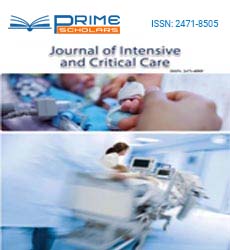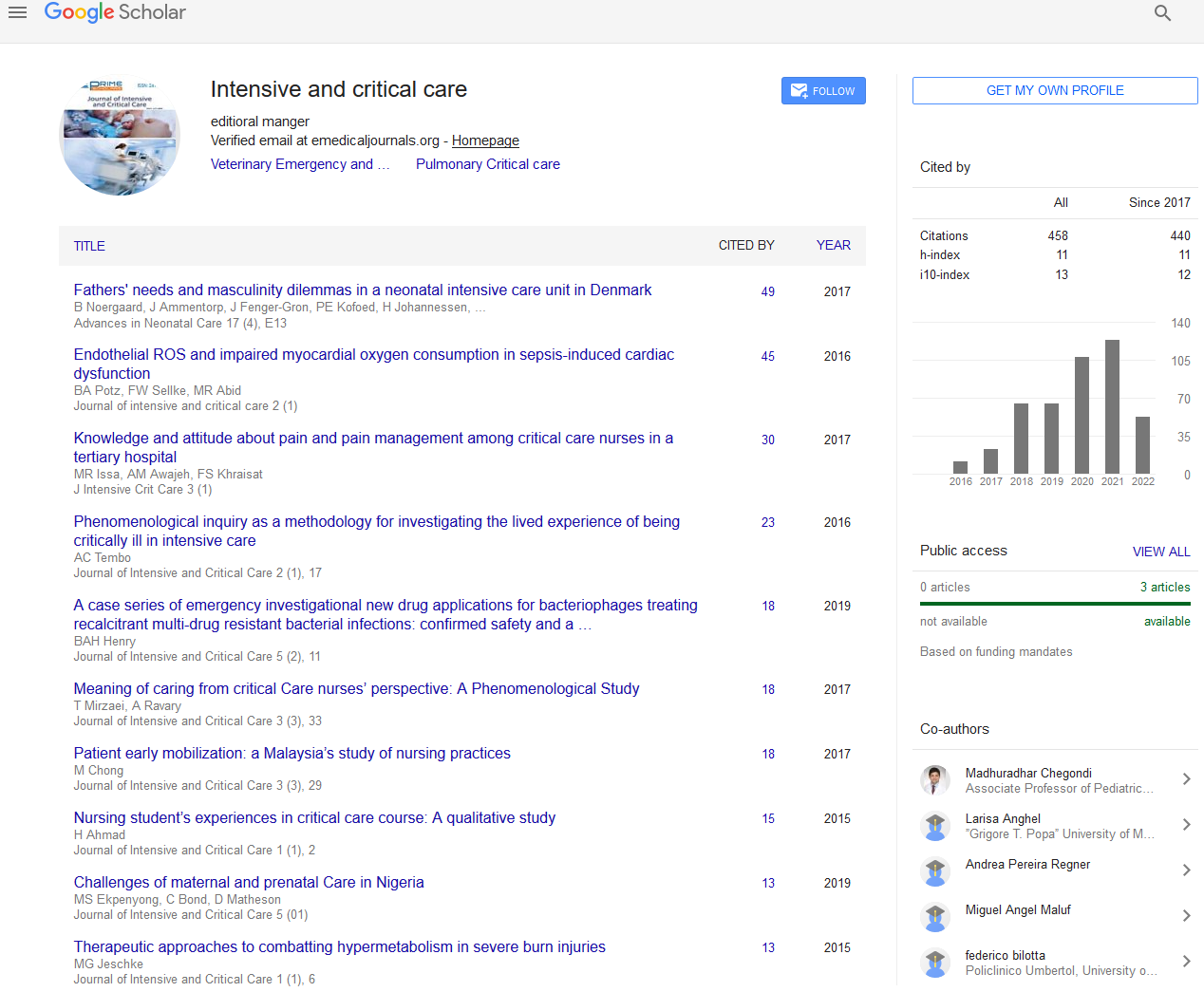Opinion - (2023) Volume 9, Issue 4
Relationship between Glycaemic Control Parameters and Clinical Outcomes in Chronic Critical Illness
Judith E Nelson*
Department of Medicine, University of Mount Sinai, USA
*Correspondence:
Judith E Nelson,
Department of Medicine, University of Mount Sinai,
USA,
Email:
Received: 01-Aug-2023, Manuscript No. IPJICC-23-17774;
Editor assigned: 03-Aug-2023, Pre QC No. IPJICC-23-17774 (PQ);
Reviewed: 17-Aug-2023, QC No. IPJICC-23-17774;
Revised: 22-Aug-2023, Manuscript No. IPJICC-23-17774 (R);
Published:
29-Aug-2023, DOI: 10.35248/2471-8505-9.4.37
Introduction
Chronic critical illness is a complex medical condition characterized
by a prolonged state of severe illness, often requiring
Intensive Care Unit (ICU) support for an extended period. It
affects individuals who experience a persistent and significant
impairment of organ function and require ongoing medical intervention.
Understanding the symptoms of chronic critical illness
is crucial for early recognition, appropriate management,
and improved patient outcomes. In this article, we delve into
the various symptoms associated with chronic critical illness
and explore their impact on patients’ lives. Respiratory dysfunction
is a hallmark of chronic critical illness. Patients often
experience persistent shortness of breath, difficulty breathing,
and decreased exercise tolerance. They may require prolonged
mechanical ventilation or assistance with breathing, such as
tracheostomy. Chronic respiratory symptoms can significantly
limit physical activities, leading to reduced quality of life and
increased vulnerability to infections. Chronic critical illness can
affect the cardiovascular system, resulting in symptoms such
as persistent low blood pressure (hypotension), rapid heart
rate (tachycardia), and decreased cardiac output. Patients may
experience dizziness, fatigue, and fluid retention, contributing
to the development of conditions like heart failure. The compromised
cardiovascular function in chronic critical illness can
have significant implications for overall health and may require
close monitoring and medical interventions.
Description
Neurological manifestations are common in chronic critical
illness. Patients may exhibit confusion, cognitive impairment,
memory deficits, and delirium. These symptoms can arise due
to various factors, including medications, infections, and the
underlying critical illness itself. The neurological consequences
of chronic critical illness pose challenges in communication, decision-
making, and rehabilitation, affecting both patients and
their caregivers. Prolonged immobility and muscle weakness
are prevalent in chronic critical illness. Patients may experience
muscle wasting (atrophy) and joint stiffness due to extended
bed rest and limited physical activity. This can lead to decreased
mobility, difficulty with basic tasks, and a higher risk of
falls. Rehabilitation and physical therapy are essential components
of managing musculoskeletal symptoms in chronic critical
illness to improve strength and functional independence.
Chronic critical illness often leads to nutritional deficiencies
and weight loss. Patients may experience reduced appetite,
difficulty swallowing (dysphagia), and altered taste sensations.
Inadequate nutrition can further exacerbate muscle wasting,
compromise immune function, and impair wound healing. Nutritional
support, the psychological impact of chronic critical
illness is substantial. Patients often experience anxiety, depression,
Post-Traumatic Stress Disorder (PTSD), and adjustment
disorders. The emotional toll of prolonged illness, combined
with the challenging ICU environment, can lead to feelings of
helplessness, isolation, and emotional distress.
Conclusion
Psychological support, counselling, and rehabilitation programs
can play a vital role in addressing these symptoms and
promoting mental well-being. Chronic critical illness makes individuals
susceptible to infections, particularly in the ICU setting.
Symptoms of infections can vary based on the site and
type of infection but commonly include fever, chills, increased
heart rate, and respiratory distress. Pneumonia, bloodstream
infections, urinary tract infections, and surgical site infections
are frequently observed in these patients. Chronic critical illness
is a multifaceted condition that affects multiple organ
systems and presents with diverse symptoms. Recognizing and
addressing these symptoms promptly are pivotal in improving
patient outcomes and enhancing quality of life.
Citation: Nelson JE (2023) Relationship between Glycaemic Control Parameters and Clinical Outcomes in Chronic Critical Illness. J Intensive Crit Care. 9:37.
Copyright: © 2023 Nelson JE. This is an open-access article distributed under the terms of the Creative Commons Attribution License, which permits unrestricted use, distribution, and reproduction in any medium, provided the original author and source are credited.

